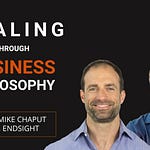In the bustling world of business, where every decision can be pivotal, the concept of a "business philosopher" might seem a bit out of place. Can thinking deep philosophical thoughts really coexist with the fast-paced demands of running a company? As it turns out, they not only can coexist, but they might be exactly what you need to drive long-term success for your business. Today, let's delve into why and how the greatest business leaders often channel their inner philosopher to build resilient, lasting companies.
Who Are These Business Philosophers?
Let's start with a quick game. Think of five prominent companies and their leaders: Microsoft, Apple, Mary Kay, Amazon, and Disney. Who comes to mind? Perhaps Bill Gates, Steve Jobs, Mary Kay Ash, Jeff Bezos, and Walt Disney. These founders not only built companies, but they also instilled a philosophy that permeated every aspect of their businesses.
"The best business philosopher for each of these companies is also its founder."
This statement might raise eyebrows or nod heads in agreement, but it introduces a fascinating perspective on leadership. The true business philosophers are those who, armed with their convictions and insights into human nature, have crafted cultures and systems that outlast even their physical presence.
Understanding Business Philosophy
First, let’s differentiate a philosopher from a business philosopher. Both do a lot of thinking, but their focus areas differ. Philosophers ponder the human condition, asking deep questions about life, morality, and truth. Business philosophers apply this type of thinking directly to the realm of commerce. They consider the human condition in the context of consumer needs and business operations, translating profound ideas into products, services, and organizational cultures.
A business philosopher, then, is someone who:
Thinks independently and authentically about their industry and the problems their company aims to solve.
Understands deeply the human condition—not just market demands but the emotional and existential needs of people.
Creates an organization that continuously addresses these human needs effectively and profitably.
This approach transforms philosophical musings into practical actions and results, which is why leaders like Steve Jobs or Mary Kay Ash resonate with so many people—they saw and met human needs in ways that were both innovative and deeply human.
Building a Self-Sustaining Organization
So, why does cultivating your inner business philosopher matter? The reasons are compelling. Empowering a business to operate independently of its founder ensures longevity and resilience, keys to enduring success. Take a moment to consider:
Does your business rely heavily on your daily involvement?
Could it survive your absence for a month, or even a week?
If you hesitated in answering these questions, exploring your internal business philosophy might be the next best step. This doesn’t mean withdrawing from your business but rather building a foundation that allows it to thrive independently through established principles and culture.
The Role of Education and Background
Interestingly, many transformative business leaders did not complete their college education. This is not to devalue formal education but to highlight that unconventional paths can also lead to extraordinary business successes. Perhaps the freedom from conventional learning environments gave these leaders the space to develop original ideas and to trust their instincts over established norms.
Practical Philosophy in Action
The quintessence of a business philosopher’s work is not just in thought but in action. Here’s how practical philosophy manifests:
Steve Jobs: Did not just invent the iPhone; he built Apple, a company that continually innovates while maintaining high quality.
Mary Kay Ash: Created more than just cosmetics; she empowered women to achieve economic independence through a unique business model.
Walt Disney: Went beyond animating cartoons to establish a beloved global brand synonymous with family entertainment and magical experiences.
Each leader built systems that do not just sell products but cultivate customer loyalty and employee engagement, ensuring the company’s growth and sustainability.
Cultivating Your Inner Business Philosopher
Embracing your inner business philosopher is about more than just personal growth—it's about setting your business up for future success. Here are three ways to start:
Reflection: Introspect about what truly matters to you and your business. What values drive your organization? Are these reflected in your everyday business practices?
Openness to Perspectives: While developing confidence in your wisdom, remain open to learning from others. This can expand your understanding and enhance your decision-making.
Community Engagement: Share your thoughts and be willing to receive feedback. Engage in meaningful conversations with peers, mentors, and other industry leaders.
This approach not only helps in nurturing your philosophical side but also ensures that your business philosophy is robust, relevant, and resonant with others.
Conclusion
The journey of discovering and nurturing your inner business philosopher is both challenging and rewarding. It dares you to blend deep thinking with practical action, ensuring that your business not only survives but thrives across generations.
Whether you're leading a startup or steering a large corporation, remember that sustainable success often requires going beyond the conventional wisdom of business strategies. It involves understanding and embodying the philosophies that make those strategies work—philosophies that you develop and refine through your experiences and reflections.
If you’re intrigued by the idea of exploring deeper into the philosophy behind successful business practices, stick around. This blog aims to uncover layers of business wisdom that can help you build a more resilient and adaptive organization. Want to dive deeper into this topic? Join the ongoing dialogue by following this blog, sharing your insights, and becoming a part of a community that values profound business transformation.
Get the Unfair Advantage I Have
One of the perks of creating solo episode such as the one I shared above is that I go through an elaborate process that includes research, writing and video and audio recording.
As I go through this process, I can’t help but have new insights about the content and deepen my understating of the things I present. I have the benefit of coming to this material from different modalities of learning.
But I want to level that playing field for you. I also want you to have the benefit of engaging with this material from different angles without getting bored or jaded. For this reason, I have created yet another experience for you to work with.
Click the button below to engage with this episode in yet another way.










